The Pekingese, a small yet majestic breed, has been prized for its captivating appearance and charming personality for generations. This proud and self-assured breed is both confident and affectionate, making it an ideal companion for those seeking a loyal and loving pet. This article will delve into the unique and endearing Pekingese temperament, examining why this breed continues to be a beloved choice among dog owners.
The Pekingese is a small dog breed that is known for its distinctive appearance, bold and independent personality, and affectionate nature. They are a loyal and devoted breed that forms strong bonds with their owners. They are also intelligent and independent dogs, which can make them somewhat challenging to train, but they are very affectionate and love to be around people.
They are generally good with children and other pets if they are socialized with them from a young age. Pekingese are a good fit for those looking for a small, affectionate companion that is also confident and independent.
In addition, they are also well-suited to apartment living, but they require regular grooming to maintain their long, flowing coat. Their unique appearance and personality make Pekingese dogs an excellent addition to any household.
Pekingese temperament
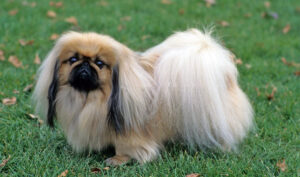
The Pekingese is a small, affectionate, and loyal dog breed. They are known for their independent and sometimes stubborn nature and love and devotion to their owners. They are generally good with children and other pets but may be wary of strangers. They are known to protect their owners and territory and may bark to alert them of any perceived threat.
Pekingese require regular grooming due to their long, silky coat and can be prone to specific health issues, including breathing and eye problems.
Pekingese are also known to be adaptable dogs that can thrive in both small apartments and large homes. They are usually good with other dogs and cats and enjoy playing and spending time with their owners. They are intelligent and can be trained, but they are also stubborn and may require patience and consistency during training.
Moreover, Pekingese are also known to be sensitive dogs and may become anxious or upset if their owners are absent for long periods. They do not require much exercise but enjoy daily walks and playing indoors. Pekingese make excellent companion dogs for those looking for a loyal, affectionate, and low-maintenance pet.
Are Pekingese dogs friendly?
Pekingese dogs are generally friendly with those they know and trust, especially their owners and family members. They are affectionate and loyal and enjoy spending time with their loved ones. However, they may be wary of strangers and bark to alert their owners of any perceived threat. With socialization and proper training, Pekingese can learn to be friendly with new people and other animals.
Remember, that each Pekingese has their personality and temperament, so there can be variations in their friendliness levels. Some Pekingese may be more outgoing and friendly with everyone they meet, while others may be more reserved and cautious.
However, Pekingese are known to be good with children and other pets if they are introduced to them at a young age and are well-socialized. They are also known to be good apartment dogs, as they do not require much exercise and are relatively low-maintenance.
Pekingese can make excellent companion dogs for those looking for a loyal and affectionate pet, as long as their owners are willing to provide them with the love, care, and attention they need.
Are Pekingese good with children?
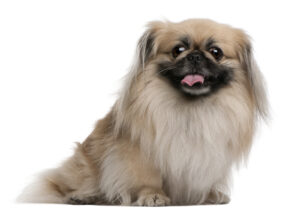
Pekingese can be good with children, especially if they are socialized with them at a young age and are well-behaved. They are generally affectionate and loyal and enjoy spending time with their family.
However, it is essential to note that Pekingese is a small breed and may not be able to handle rough play or handling from young children.
Additionally, children should always be supervised when interacting with any breed of dog to ensure the safety of both the dog and the child. Overall, Pekingese can make good family pets for those who have older, well-behaved children and are looking for a loyal and affectionate companion.
Are Pekingese good with other pets?
Pekingese are often known to be one-person dogs and can be aloof or wary of strangers, including other pets. However, they can learn to get along with other animals with proper socialization and training. It’s important to supervise interactions between Pekingese and other pets, especially with smaller animals, as Pekingese may view them as prey.
In addition, Pekingese are small dogs originally bred as lap dogs for royalty in ancient China. They are affectionate and devoted to their owners but can be stubborn and independent. Proper socialization and training are crucial for Pekingese to be able to coexist peacefully with other pets in the household.
Introduce new pets slowly and under supervision, and provide plenty of positive reinforcement during interactions to encourage good behavior. Remember that each Pekingese has its personality and behavior; some may be more accepting of other pets than others.
Are Pekingese easy to train?

Pekingese can be challenging to train due to their independent and stubborn nature. They were bred to be lap dogs for royalty, so they may not see the need to follow commands or please their owners. However, with consistent, positive reinforcement training and plenty of patience, they can learn basic obedience commands and good household manners.
Early socialization and training can also help them adjust to living with other pets and people. Remember that every Pekingese is unique, and some may be more receptive to training than others.
Training a Pekingese requires patience, consistency, and positive reinforcement. Treats, praise, and affection are all effective motivators for Pekingese. Avoid using punishment or physical force, as this can cause fear or aggression in these dogs.
It’s vital to start training Pekingese early when they are still impressionable and more likely to learn quickly. Basic obedience training is a good starting point, including commands such as “sit,” “stay,” “come,” and “heel.” Training should be a positive and enjoyable experience for the dog and the owner.
Socialization is also an essential aspect of training for Pekingese. Exposing them to various people, places, and other animals can help them become well-rounded and confident. This can also help prevent fear or aggressive behavior towards strangers and other pets.
Are Pekingese good guard dogs?
Pekingese are not typically effective as guard dogs. Despite their small size, they are known to be brave and fearless, which can sometimes lead them to bark at unfamiliar people or animals. However, they were originally bred as lap dogs for royalty and were not selected for their guarding abilities.
In addition, Pekingese tend to be friendly and affectionate with those they know and may not have the necessary instincts to protect their home or family. It’s also important to note that they are small and may need to be physically capable of defending their home. If you’re looking for a guard dog, it may better suit other breeds for this purpose.
Are Pekingese good apartment dogs?
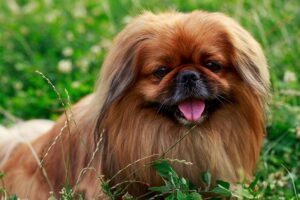
Pekingese can make good apartment dogs. They are a small breed and only require a little space to live comfortably. They were initially bred as lap dogs for royalty and are well-suited for a more sedentary lifestyle. Pekingese do not require a lot of exercises but need daily walks to satisfy their physical and mental needs.
Remember that Pekingese are indoor dogs and are not well-suited for outdoor living. They are sensitive to temperature changes and do not tolerate extreme hot or cold weather well. With proper care and attention, Pekingese can thrive in apartment living and make great companion dogs for those who can provide them with the love and attention they need.
Are Pekingese good for first-time owners?
There may be better choices than Pekingese for first-time dog owners. While they are affectionate and devoted to their owners, they can be stubborn and independent, making training and obedience challenging. They may also be prone to specific health issues, such as breathing problems due to their flat faces requiring specialized care.
First-time dog owners may benefit from considering a breed that is known for its trainability and adaptability, such as a Labrador Retriever or a Golden Retriever. These breeds are generally more eager to please and easier to train, making the transition to dog ownership easier for first-time owners.
However, suppose a Pekingese is the dog of your dreams, with patience, persistence, and proper training. In that case, they can make great companions for experienced dog owners or those willing to invest the time and energy into properly caring for and training them.
Are Pekingese lap dogs?
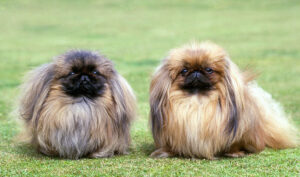
Yes, Pekingese are often referred to as lap dogs. They were initially bred as companion dogs for royalty in ancient China and are well-known for their affectionate and lap-loving nature. Pekingese are small dogs, typically weighing between 7 and 14 pounds, which makes them ideal for snuggling on laps.
Moreover, They are also known to be devoted and loyal to their owners, making them great companions for those who enjoy spending time at home. A Pekingese may be a good choice for you if you’re looking for a lap dog.
Are Pekingese hypoallergenic?
Pekingese are not considered to be hypoallergenic dogs. Hypoallergenic means that a dog is less likely to cause an allergic reaction in people allergic to dogs. While some breeds, such as Poodle and Bichon Frise, are often referred to as hypoallergenic, this term is not scientifically accurate as no dog is 100% hypoallergenic.
All dogs produce dander, which is the source of most dog allergies, and Pekingese are no exception.
If you have allergies, it’s crucial to spend time with a dog before you bring one home to see if you react. Some people may be more sensitive to particular breeds, so it’s a good idea to research different species to see which one may be a good fit for you.
Generally, breeds that shed less and produce less dander, such as Poodle and Bichon Frise, are often considered more allergy-friendly.
Do Pekingese have a lot of energy?
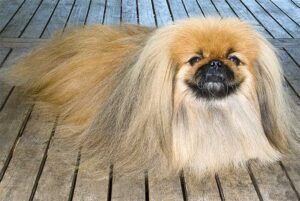
Pekingese is a relatively low-energy breed. They were initially bred as companion dogs for royalty and were not selected for their high energy levels. They tend to be more sedentary and prefer to spend their days lounging on laps or napping. While Pekingese need daily walks for physical and mental stimulation, they do not require a lot of intensive exercises.
This breed is well-suited for seniors, people with a more sedentary lifestyle, or those who live in apartments or smaller homes. Pekingese are not known for their high energy levels, but they can still be playful and enjoy spending time with their owners. A Pekingese may be a good choice if you’re looking for a low-energy dog that is happy to spend time at home with you.
Do Pekingese have a lot of grooming needs?
Pekingese have moderate to high grooming needs. They have a long, dense coat that requires regular grooming to maintain their appearance and prevent matting. It is recommended to brush their coat at least once a week and to trim their fur every few months to keep it in good condition.
In addition to their coat, Pekingese also have wrinkles on their face that need to be cleaned regularly to prevent infections.
Pekingese are also prone to eye infections, so keeping their eyes clean and dry is essential. Their long ears can also be prone to infections, so they should be checked regularly and kept clean.
If you’re considering a Pekingese, it’s essential to understand the grooming needs of this breed and be prepared to dedicate the time and resources necessary to maintain their coat and overall health. If you’re uncomfortable with regular grooming or need more time to devote, a Pekingese may not be the right breed.
Do Pekingese bark a lot?
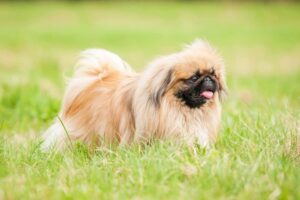
Pekingese can be prone to excessive barking. They were originally bred to be watchdogs, and their barking instincts have remained strong. Pekingese may bark at strange noises or unfamiliar people and bark out of boredom or anxiety. While barking can be a natural and normal behavior for dogs, excessive barking can be a problem for some owners, especially if you live in an apartment or close quarters.
Training and positive reinforcement can help to reduce excessive barking in Pekingese, but it’s essential to understand that some barking may be normal behavior for this breed. If you’re considering a Pekingese, it’s critical to research this breed and understands its barking tendencies before bringing one home.
If excessive barking is a concern, consider a breed that is known for being quiet, such as a Basset Hound or a Bulldog.
Do Pekingese shed a lot?
Pekingese do shed, but they are not considered to be heavy shedders. Their long, dense coat typically sheds moderately, but the amount of shedding can vary from dog to dog. Regular grooming, such as brushing, can help to reduce shedding and keep their coat in good condition.
If you’re sensitive to pet hair or have allergies, it’s essential to spend time with a Pekingese before bringing one home to see how you react to their shedding. While Pekingese are not considered heavy shedders, some individuals may shed more than others, so it’s essential to research this breed and understand their shedding tendencies before committing.
Pekingese are not known for being heavy shedders, but they do shed, so it’s essential to be prepared for some pet hair in your home if you’re considering this breed.
Do Pekingese have any health issues?
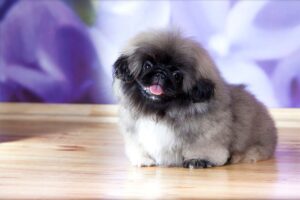
Like all breeds, Pekingese are prone to specific health issues. Some of the most common health issues that may affect Pekingese include:
1. Brachycephaly (flat-faced skull): Pekingese have short, flat faces, which can lead to breathing difficulties and eye irritation.
2. Intervertebral Disk Disease (IVDD): This is a common condition in Pekingese, where the disks between the vertebrae of the spine begin to degenerate and bulge, causing pain and mobility issues.
3. Patellar Luxation: This is a condition where the kneecap dislocates from its proper position, causing pain and lameness.
4. Eye Problems: Pekingese have large, prominent eyes prone to injury and infection.
5. Dental Problems: Pekingese tend to develop dental problems, such as periodontal disease and overcrowding of teeth.
6. Obesity: Pekingese tend to gain weight, leading to several health problems, such as joint problems, breathing difficulties, and decreased life expectancy.
While these health issues can be concerning, they can often be prevented or managed with proper care and regular veterinary check-ups. Researching the breed and working with a reputable breeder to ensure you get a healthy dog is essential.
Regular veterinary check-ups, a healthy diet, and regular exercise can help keep your Pekingese healthy and happy for many years.
Conclusion
In conclusion, the Pekingese is a unique and charming breed known for its loyalty and affectionate nature. These dogs are generally good with children and other pets but can be wary of strangers and bark excessively if not properly trained.
Pekingese are typically low-energy dogs and make great lap dogs, but they have moderate to high grooming needs due to their long, dense coats. While they are prone to specific health issues, these can often be prevented or managed with proper care and regular veterinary check-ups.
If you’re considering a Pekingese temperament, it’s essential to research the breed and work with a reputable breeder to ensure that you get a healthy dog with a temperament that is well-suited to your lifestyle. A Pekingese can make an excellent addition to any family with proper care and attention.


